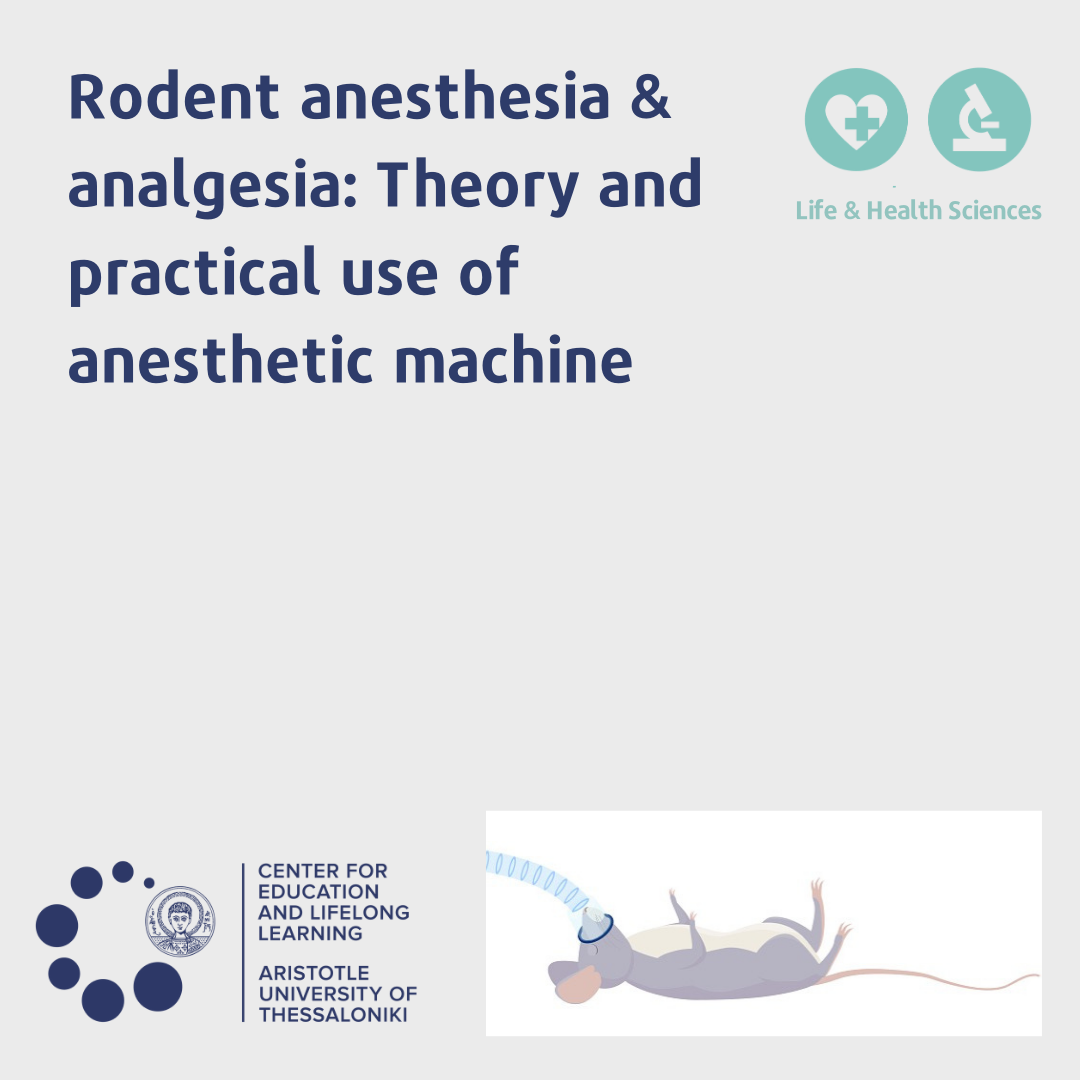2024-03-29 - 2024-03-29 ( 6 hours )
Physical Presence
Form Submission is completed on
Form Submission is completed on

The Center for Education and Lifelong Learning of the Aristotle University of Thessaloniki welcomes you to the “Rodent anesthesia and analgesia: theory and practical use of anesthetic machine” workshop, six hours in person course at the Laboratory of Anatomy, Histology and Embryology, School of Veterinary Medicine, Faculty of Health Sciences, AUTh.
The program will present current approaches on rodent anesthesia and analgesia, and exhibit use of an anesthetic machine. Understanding rodent anesthesia and analgesia is crucial for ensuring humane and ethical treatment of animals in research practice, and a requirement from the European legislation protecting the animals used in research. Participants will receive a Certificate (1 ECTS) following full attendance and a short examination.
The Scientific Director of the Program is Anastasia Tsingotjidou, Assistant Professor in Anatomy, Histology and Embryology, School of Veterinary Medicine, Faculty of Health Sciences. She has vast experience in the use of laboratory animals in research, is the President of the National Committee for the Welfare of Animals used for Scientific Purposes, and the Chair of the Organizing Committee for the FELASA 2025 meeting: https://www.felasa2025.eu/
Start Date: Friday, 29 March 2024
End of the course: Friday, 29 March 2024
Duration: 6 hours
Cost: 200 euros
Discount: not applicable
Certificate/ECTS: Yes/1
Applications are submitted online from 20/03/2024 to 28/03/2024
Teaching Staff
Pavlos Lelovas, DVM, PhD, Designated Veterinarian, Lab of Experimental and Research Surgery, Medical School, National Kapodistrian University of Athens
Vasileios Ntafis, DVM, MSc, PhD, Head, Animal Facilities, BSRC ALEXANDER FLEMING
Cholawat Pacharinsak, Associate Professor at Stanford University’s Department of Comparative Medicine; DVM, PhD, DACVAA: https://profiles.stanford.edu/cholawat-pacharinsak
Patrick Sharp, DVM, MRCVS, MANZCVS, DACLAM
Anastasia Tsingotjidou, Assistant Professor in Anatomy, Histology and Embryology, School of Veterinary Medicine, Faculty of Health Sciences: https://astsing.webpages.auth.gr/
Argyro Zacharioudaki, DVM MLAS Dipl. ECLAM, BIOEMTECH Laboratories
The aim of the workshop is to provide participants with the knowledge, skills, and confidence needed to effectively and ethically administer anesthesia and analgesia to rodents (mice and rats), thereby promoting the welfare of animals used in research and improving the quality and translatability of scientific outcomes.
Upon completion of the course, participants will be able to identify and select appropriate anesthetic agents and techniques for rodents based on factors such as species, age, weight, and experimental requirements. They should understand the pharmacokinetics, dosages, and routes of administration for commonly used agents. Additionally, they should be able to handle and use an anesthetic machine to provide inhalational anesthesia.
Participants will be competent in monitoring vital signs during anesthesia, including heart rate, respiratory rate, temperature, and blood pressure, and should understand how to respond to deviations from normal values. They should also learn about supportive measures to maintain physiological stability.
They should develop problem-solving skills to address challenges encountered during anesthesia and analgesia procedures, including troubleshooting equipment issues, managing complications, and making informed decisions about anesthesia protocols.
The program is addressed to veterinarians, medical doctors, dentists, pharmacists, and all scientists from biological sciences, or from other scientific backgrounds such as psychology and/or engineering, who use rodents for scientific purposes. Veterinary medicine students in the last year of their studies will also be accepted.
Prerequisites to submit an Application Form:
The above are required to complete the examination following the theory and the practice.
The program contains theoretical and practical presentation of:
During the discussion session, participants are encouraged to bring questions and information for other species used at their facilities.
Workshop Program
| 9.30 – 10.00 | Introduction |
| 10.00 – 10.30 | Inhalational anesthesia |
| 10.30 – 11.00 | Injectable Anesthesia |
| 11.00 – 11.30 | Analgesia |
| 11.30 – 12.00 | Green Vivarium |
| 12.00 – 13.00 | Lunch |
| 13.00 – 14.00 | Discussion (Q & A) |
| 14.00-14.30 | Break |
| 14.30-16.30 | Use of anesthetic machine for rodents |
| 16.30-17.00 | Online test |
Obligations of Trainees:
Rights of Trainees:
After successful completion of the program, participants receive a Certificate of Specialised Training on rodent anesthesia and analgesia which is issued by the Center for Education and Lifelong Learning of the AUTH and signed by the President of the Center.
Participants, who have attended but not successfully completed the program, will be awarded a Certificate of Attendance.
For further information, please contact:
Name/Surname: Anastasia Tsingotjidou
Tel: +30 2310999941
Email: astsing@vet.auth.gr
Tuition fees is 200 euros. Final date of deposit is 28/03/2024.
Acount number: 5202-057157-381
IBAN: GR94 0172 2020 0052 0205 7157 381
Code Bic (SWIFT Address): PIRBGRAA
When you submit your deposit please write your name/surname along with the code 10667.
Candidates submit the Application Form online. Each application has to be accompanied by a CV stating the involvement in the use of animals (especially rodents) in research. Supporting documents can be sent to the following email: rodanesthesia2024@gmail.com
Μπορείτε να εγγραφείτε στο Newsletter για να μαθαίνετε πρώτοι για τα νέα προγράμματα του ΚΕΔΙΒΙΜ ΑΠΘ.